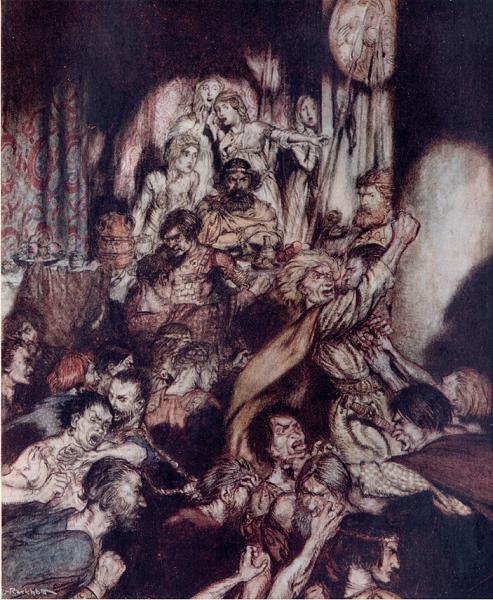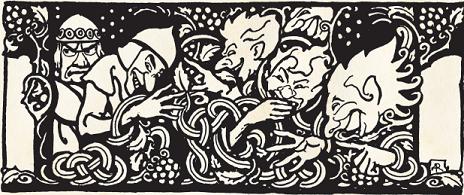Irish Fairy Tales (18 page)

“It is true,” said Fionn.
Goll's anger fled at the word.
“Do not be jealous of me, dear heart, for if I had twice the tribute I would give it to you and to Ireland.”
But at the word jealous the Chief's anger revived.
“It is an impertinence,” he cried, “to boast at this table that you killed my father.”
“By my hand,” Goll replied, “if Fionn were to treat me as his father did I would treat Fionn the way I treated Fionn's father.”
Fionn closed his eyes and beat away the anger that was rising within him. He smiled grimly.
“If I were so minded, I would not let that last word go with you, Goll, for I have here an hundred men for every man of yours.”
Goll laughed aloud.
“So had your father,” he said.
Fionn's brother, Cairell Whiteskin, broke into the conversation with a harsh laugh.
“How many of Fionn's household has the wonderful Goll put down?” he cried.
But Goll's brother, bald Conán the Swearer, turned a savage eye on Cairell.
“By my weapons,” said he, “there were never less than an hundred-and-one men with Goll, and the least of them could have put you down easily enough.”
“Ah?” cried Cairell. “And are you one of the hundred-and-one, old scaldhead?”
“One indeed, my thick-witted, thin-livered Cairell, and I undertake to prove on your hide that what my brother said was true and that what your brother said was false.”
“You undertake that,” growled Cairell, and on the word he loosed a furious buffet at Conán, which Conán returned with a fist so big that every part of Cairell's face was hit with the one blow. The two then fell into grips, and went lurching and punching about the great hall. Two of Oscar's sons could not bear to see their uncle being worsted, and they leaped at Conán, and two of Goll's sons rushed at them. Then Oscar himself leaped up, and with a hammer in either hand he went battering into the melee.
“I thank the gods,” said Conán, “for the chance of killing yourself, Oscar.”
These two encountered then, and Oscar knocked a groan of distress out of Conán. He looked appealingly at his brother Art og mac Morna, and that powerful champion flew to his aid and wounded Oscar. OisÃn, Oscar's father, could not abide that; he dashed in and quelled Art Og. Then Rough Hair mac Morna wounded OisÃn and was himself tumbled by mac Lugac, who was again wounded by Gara mac Morna.
The banqueting hall was in tumult. In every part of it men were giving and taking blows. Here two champions with their arms round each other's necks were stamping round and round in a slow, sad dance. Here were two crouching against each other, looking for a soft place to hit. Yonder a big-shouldered person lifted another man in his arms and threw him at a small group that charged him. In a retired corner a gentleman stood in a thoughtful attitude while he tried to pull out a tooth that had been knocked loose.
“You can't fight,” he mumbled, “with a loose shoe or a loose tooth.”
“Hurry up with that tooth,” the man in front of him grumbled, “for I want to knock out another one.”
Pressed against the wall was a bevy of ladies, some of whom were screaming and some laughing and all of whom were calling on the men to go back to their seats.
Only two people remained seated in the hall.
Goll sat twisted round watching the progress of the brawl critically, and Fionn, sitting opposite, watched Goll.
Just then Faelan, another of Fionn's sons, stormed the hall with three hundred of the Fianna, and by this force all Goll's people were put out of doors, where the fight continued.
Goll looked then calmly on Fionn.
“Your people are using their weapons,” said he.
“Are they?” Fionn inquired as calmly, and as though addressing the air.
“In the matter of weaponsâ!” said Goll.
And the hard-fighting pillar of battle turned to where his arms hung on the wall behind him. He took his solid, well-balanced sword in his fist, over his left arm his ample, bossy shield, and, with another side-look at Fionn, he left the hall and charged irresistibly into the fray.

The banqueting hall was in tumult
Fionn then arose. He took his accoutrements from the wall also and strode out. Then he raised the triumphant Fenian shout and went into the combat.
That was no place for a sick person to be. It was not the corner which a slender-fingered woman would choose to do up her hair; nor was it the spot an ancient man would select to think quietly in, for the tumult of sword on sword, of axe on shield, the roar of the contending parties, the crying of wounded men, and the screaming of frightened women destroyed peace, and over all was the rallying cry of Goll mac Morna and the great shout of Fionn.
Then Fergus True-Lips gathered about him all the poets of the Fianna, and they surrounded the combatants. They began to chant and intone long, heavy rhymes and incantations, until the rhythmic beating of their voices covered even the noise of war, so that the men stopped hacking and hewing, and let their weapons drop from their hands. These were picked up by the poets and a reconciliation was effected between the two parties.
But Fionn affirmed that he would make no peace with clann-Morna until the matter had been judged by the king, Cormac mac Art, and by his daughter Ailve, and by his son Cairbre of Ana Lifé and by Fintan the chief poet. Goll agreed that the affair should be submitted to that court, and a day was appointed, a fortnight from that date, to meet at Tara of the Kings for judgement. Then the hall was cleansed and the banquet recommenced.
Of Fionn's people eleven hundred of men and women were dead, while of Goll's people eleven men and fifty women were dead. But it was through fright the women died, for not one of them had a wound or a bruise or a mark.
1
This version of the death of Uail is not correct. Also Cnocha is not in Lochlann but in Ireland.
Chapter 3
A
T the end of a fortnight Fionn and Goll and the chief men of the Fianna attended at Tara. The king, his son and daughter, with Flahri, Feehal, and Fintan mac Bocna, sat in the place of judgement, and Cormac called on the witnesses for evidence.
Fionn stood up, but the moment he did so Goll mac Morna arose also.
“I object to Fionn giving evidence,” said he.
“Why so?” the king asked.
“Because in any matter that concerned me Fionn would turn a lie into truth and the truth into a lie.”
“I do not think that is so,” said Fionn.
“You see, he has already commenced it,” cried Goll.
“If you object to the testimony of the chief person present, in what way are we to obtain evidence?” the king demanded.
“I,” said Goll, “will trust to the evidence of Fergus True-Lips. He is Fionn's poet, and will tell no lie against his master; he is a poet, and will tell no lie against any one.”
“I agree to that,” said Fionn.
“I require, nevertheless,” Goll continued, “that Fergus should swear before the Court, by his gods, that he will do justice between us.”
Fergus was accordingly sworn, and gave his evidence.
He stated that Fionn's brother Cairell struck Conán mac Morna, that Goll's two sons came to help Conán, that Oscar went to help Cairell, and with that Fionn's people and the clann-Morna rose at each other, and what had started as a brawl ended as a battle with eleven hundred of Fionn's people and sixty-one of Goll's people dead.
“I marvel,” said the king in a discontented voice, “that, considering the numbers against them, the losses of clann-Morna should be so small.”
Fionn blushed when he heard that.
Fergus replied:
“Goll mac Morna covered his people with his shield. All that slaughter was done by him.”
“The press was too great,” Fionn grumbled. “I could not get at him in time orâ”
“Or what?” said Goll with a great laugh.
Fionn shook his head sternly and said no more.
“What is your judgement?” Cormac demanded of his fellow-judges.
Flahri pronounced first.
“I give damages to clann-Morna.”
“Why?” said Cormac.
“Because they were attacked first.”
Cormac looked at him stubbornly.
“I do not agree with your judgement,” he said.
“What is there faulty in it?” Flahri asked.
“You have not considered,” the king replied, “that a soldier owes obedience to his captain, and that, given the time and the place, Fionn was the captain and Goll was only a simple soldier.”
Flahri considered the king's suggestion.
“That,” he said, “would hold good for the white-striking or blows of fists, but not for the red-striking or sword-strokes.”
“What is your judgement?” the king asked Feehal. Feehal then pronounced:
“I hold that clann-Morna were attacked first, and that they are to be free from payment of damages.”
“And as regards Fionn?” said Cormac.
“I hold that on account of his great losses Fionn is to be exempt from payment of damages, and that his losses are to be considered as damages.”
“I agree in that judgement,” said Fintan.
The king and his son also agreed, and the decision was imparted to the Fianna.
“One must abide by a judgement,” said Fionn.
“Do you abide by it?” Goll demanded.
“I do,” said Fionn.
Goll and Fionn then kissed each other, and thus peace was made. For, notwithstanding the endless bicker of these two heroes, they loved each other well.
Yet, now that the years have gone by, I think the fault lay with Goll and not with Fionn, and that the judgement given did not consider everything. For at that table Goll should not have given greater gifts than his master and host did. And it was not right of Goll to take by force the position of greatest gift-giver of the Fianna, for there was never in the world one greater at giving gifts, or giving battle, or making poems than Fionn was.
That side of the affair was not brought before the Court. But perhaps it was suppressed out of delicacy for Fionn, for if Goll could be accused of ostentation, Fionn was open to the uglier charge of jealousy. It was, nevertheless, Goll's forward and impish temper which commenced the brawl, and the verdict of time must be to exonerate Fionn and to let the blame go where it is merited.
There is, however, this to be added and remembered, that whenever Fionn was in a tight corner it was Goll that plucked him out of it; and, later on, when time did his worst on them all and the Fianna were sent to hell as unbelievers, it was Goll mac Morna who assaulted hell, with a chain in his great fist and three iron balls swinging from it, and it was he who attacked the hosts of great devils and brought Fionn and the Fianna-Finn out with him.

Chapter 1
O
ne day something happened to Fionn, the son of Uail; that is, he departed from the world of men, and was set wandering in great distress of mind through Faery. He had days and nights there and adventures there, and was able to bring back the memory of these.